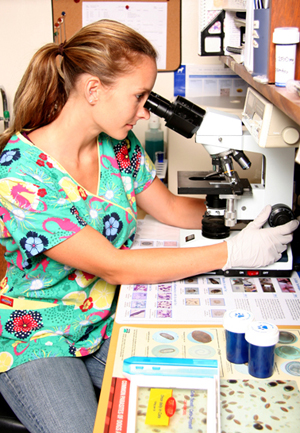Approved in November 2011, clinical pathology is one of the newest specialty options for veterinary technicians. Created for vet techs who excel and enjoy work in laboratory settings, this new specialty gives individuals a higher level of recognition for their advanced clinical pathology knowledge and skills.
Vet techs specializing in clinical pathology may work in research labs, clinics, diagnostic labs, reference labs, in private or government facilities, or in academia.
Those who obtain this certification demonstrate a higher level of ability than the average veterinary technician, and will enjoy more opportunities for professional and personal growth. In many cases, this specialization can lead to higher salaries. Specialization in clinical pathology is a great way to show potential employers not only your skills, but your commitment to the profession.
Vet techs who wish to pursue this specialty must do so through the Academy of Veterinary Clinical Pathology Technicians (AVCPT).
Application Requirements:
- Must be a graduate of an accredited AVMA veterinary technician school.
- Passing score on the Veterinary Technician National Exam (VTNE).
- 3 years (4,000 hours minimum) work experience in the field of veterinary clinical pathology.
- 40 continuing education (CE) hours related to veterinary clinical pathology.
- Completion of the veterinary clinical pathology skills form (provided by the approval committee).
- 1-year case log reflecting the mastery of advanced veterinary clinical pathology skills.
- 5 detailed case reports demonstrating expertise in laboratory/pathology services.
- 2 of recommendations from two different categories: an AVCPT member, a supporting veterinarian, supporting credentialed technician, a member of the American Society of Veterinary Clinical Pathology (ASVCP), or a veterinary technology specialist (VTS) in any of the NAVTA approved specialties.
Keep in mind that any work in veterinary clinical pathology that was completed prior to graduation or receiving credentials will not count towards experience or case logs.
If you want to start preparing for a vet tech specialty in clinical pathology, consider getting a head start by reading books and articles related to the subject. Some possible topics worthy of research are
- hematology
- quality control and assurance
- clinical chemistry
- coagulation
- urinalysis
- cytology
- microbiology and parasitology
